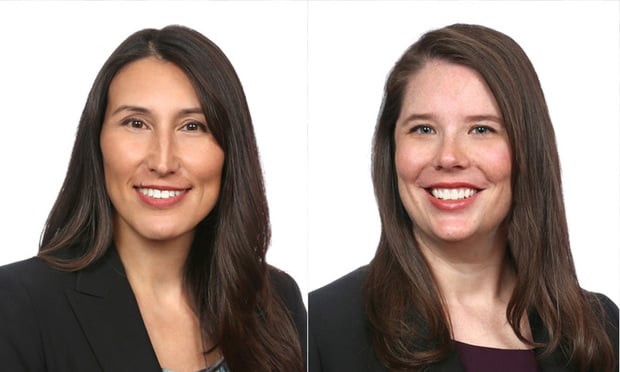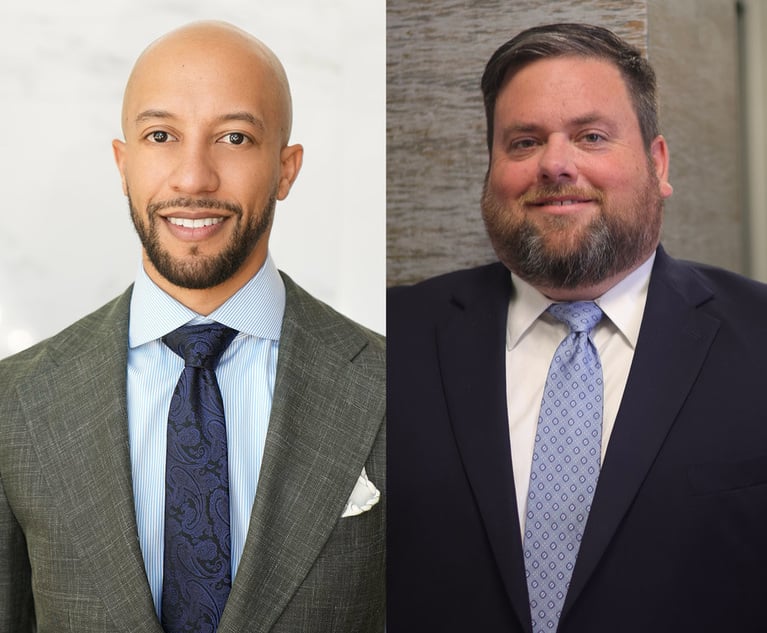Litigation Funding in a COVID-19 World
Litigants seeking outside funding must often share work product information with their potential funders, but if such materials were disclosed publicly or to an opponent, it could seriously undermine a client's case.
June 15, 2020 at 01:13 PM
6 minute read
 Shari Klevens (left) and Alanna Clair, Dentons. (Courtesy photo)
Shari Klevens (left) and Alanna Clair, Dentons. (Courtesy photo)
As the nation continues to reel from quarantining and the effect that quarantining has had on the economy, lawyers and litigants may be looking for ways to protect themselves and their assets. One topic that has been the subject of significant commentary in recent years—and even more so in the throes of this pandemic—has been litigation funding.
Although litigation funding arrangements can take many different forms, in most instances, a third party (such as a litigation funding company) pays a litigant's attorneys' fees and other costs in exchange for an interest in the outcome of the lawsuit. Litigation funders assess the strengths of litigation as an investment. In this way, litigation funding can provide access to justice for litigants that otherwise could not afford it, or can help minimize the risks for litigants by sharing the costs and risks with a third party.
Statistics indicate that the use of litigation funding is growing and is becoming yet another tool in the litigant's tool belt. And as law firms feel pressure from economic slowdowns and clients seek remedies, litigation funding may be an opportunity that some have overlooked.
An Asset for Firms and for Clients
Litigation financing companies typically invest in plaintiff-side work (although some funders will invest in a portfolio of both plaintiff-side and defendant-side work). Some law firms are getting into that business as well. As reported in the legal news recently, there are high-profile large law firms—that traditionally engaged in defense work—that are exploring self-funding plaintiff's side contingency work as a revenue-generating proposition. This has prompted other large and medium sized law firms to start exploring legal finance.
Large law firms typically depend on hourly legal fees from clients to ensure the health and success of their business. However, as financial pressures on firms and clients increase, many firms are exploring the potential business opportunity to work with litigation funders to guarantee fees and to help clients save on their own bottom line.
Experts expect to see a flurry of litigation funding activity in the aftermath of the COVID-19 pandemic. This is because clients and law firms alike may be experiencing cash shortages or layoffs as a result of pandemic-related issues. Working with a litigation funder can help ensure that law firms are paid in real time for their work and to help ease the burdens on cash-poor clients to pay legal fees during financial duress. Even large corporate clients can therefore be freed up to generate cash flow and to let a funder finance their litigation, which litigation itself is an asset and can be a revenue-generating enterprise.
Many high-profile litigation funding companies were borne out of the 2008 financial crisis. Similar opportunities are expected to arise in the aftermath of 2020's news events.
Acceptance in the Community
Over the years, most observers have agreed that there is nothing inherently unethical about litigation financing and that it can serve a positive purpose in ensuring access to the court system.
One criticism of litigation funding is that it could increase the amount of frivolous litigation in an already-burdened system. However, before making an investment, funders will typically review the merits of a case, assess the likelihood of success and determine the potential upside. Therefore, there is a presumption that because funders do not want to lose money in bad investments, they have an incentive to support only those cases that have merit. Many litigation funders also will work only with experienced legal counsel. Of course, Rule 11 and other prohibitions against frivolous litigation also serve as a safeguard here.
While there still are ethical parameters that shape the relationship between funder and litigant, the legal community at large is recognizing the positive attributes of litigation funding. For example, a few years ago, the New York City bar issued an opinion that was very critical of litigation funding and suggested that such arrangements could run contrary to the ethical rules against fee-sharing with nonlawyers. This spring, however, the Litigation Funding Working Group of the New York City Bar Association issued a 91-page report reflecting its study of litigation funding and concluding, among other things, that "lawyers and the clients they serve would benefit if lawyers have less restricted access to funding," recommending that there should not be mandatory disclosure requirements in courts relating to funding arrangements, and identifying specific rule changes that may be warranted.
Protecting the Privilege
It is helpful for litigants and their attorneys to take steps to protect the confidentiality and privilege surrounding their materials when working with litigation funders. Like other ethical issues surrounding litigation funding (such as disclosure obligations), there are solutions.
In order to obtain litigation funding, litigants must often share work product information with their potential funders that the funders will use to assess the strength of the case. This information could include summaries of witness interviews, outlines of the strategy, and counsel's mental impressions of the case. Obviously, if such materials were disclosed publicly or to an opponent, it could seriously undermine a client's case.
Thus, it is common for litigants and funders to enact written agreements to try to protect confidentiality and invoke the work product doctrine—before materials are provided (even if the litigant and funder decide not to work together). Such agreements could also indicate that the relationship with the funder began for a protected purpose and that the materials shared with the funder were created in anticipation of litigation. Many courts have recognized that materials exchanged between a litigation funder, a litigant, and the litigant's counsel are protected from disclosure by the work product doctrine.
Privileged materials may not always reflect the mental impressions of counsel, and disclosure of privileged information can subject it to waiver. Some courts have found that the "agency" exception applies to communications with funders, comparing litigation funders to other non-lawyer professionals like experts, accountants, or consultants. However, many litigants will consider providing their funders with only work product materials, given the breadth of protection.
Shari L. Klevens is a partner at Dentons in Atlanta and Washington, D.C., and serves on the firm's U.S. board of directors. She represents and advises lawyers and insurers on complex claims and is co-chair of Dentons' global insurance sector team.
Alanna Clair, also a partner at the firm in Washington, focuses on professional liability and insurance defense. Klevens and Clair are co-authors of "The Lawyer's Handbook: Ethics Compliance and Claim Avoidance" and the 2020 edition of "Georgia Legal Malpractice Law."
This content has been archived. It is available through our partners, LexisNexis® and Bloomberg Law.
To view this content, please continue to their sites.
Not a Lexis Subscriber?
Subscribe Now
Not a Bloomberg Law Subscriber?
Subscribe Now
NOT FOR REPRINT
© 2025 ALM Global, LLC, All Rights Reserved. Request academic re-use from www.copyright.com. All other uses, submit a request to [email protected]. For more information visit Asset & Logo Licensing.
You Might Like
View All
'Didn't Notice Patient Wasn't Breathing': $13.7M Verdict Against Anesthesiologists
12 minute read
Trial Court Had No Authority to Reopen Voir Dire After Jury Impaneled in Civil Case, State Appellate Court Rules

'Pushed Into Oncoming Traffic': $5.85M Settlement in Mediated Auto Tort
6 minute readLaw Firms Mentioned
Trending Stories
- 1US DOJ Threatens to Prosecute Local Officials Who Don't Aid Immigration Enforcement
- 2Kirkland Is Entering a New Market. Will Its Rates Get a Warm Welcome?
- 3African Law Firm Investigated Over ‘AI-Generated’ Case References
- 4Gen AI and Associate Legal Writing: Davis Wright Tremaine's New Training Model
- 5Departing Attorneys Sue Their Former Law Firm
Who Got The Work
J. Brugh Lower of Gibbons has entered an appearance for industrial equipment supplier Devco Corporation in a pending trademark infringement lawsuit. The suit, accusing the defendant of selling knock-off Graco products, was filed Dec. 18 in New Jersey District Court by Rivkin Radler on behalf of Graco Inc. and Graco Minnesota. The case, assigned to U.S. District Judge Zahid N. Quraishi, is 3:24-cv-11294, Graco Inc. et al v. Devco Corporation.
Who Got The Work
Rebecca Maller-Stein and Kent A. Yalowitz of Arnold & Porter Kaye Scholer have entered their appearances for Hanaco Venture Capital and its executives, Lior Prosor and David Frankel, in a pending securities lawsuit. The action, filed on Dec. 24 in New York Southern District Court by Zell, Aron & Co. on behalf of Goldeneye Advisors, accuses the defendants of negligently and fraudulently managing the plaintiff's $1 million investment. The case, assigned to U.S. District Judge Vernon S. Broderick, is 1:24-cv-09918, Goldeneye Advisors, LLC v. Hanaco Venture Capital, Ltd. et al.
Who Got The Work
Attorneys from A&O Shearman has stepped in as defense counsel for Toronto-Dominion Bank and other defendants in a pending securities class action. The suit, filed Dec. 11 in New York Southern District Court by Bleichmar Fonti & Auld, accuses the defendants of concealing the bank's 'pervasive' deficiencies in regards to its compliance with the Bank Secrecy Act and the quality of its anti-money laundering controls. The case, assigned to U.S. District Judge Arun Subramanian, is 1:24-cv-09445, Gonzalez v. The Toronto-Dominion Bank et al.
Who Got The Work
Crown Castle International, a Pennsylvania company providing shared communications infrastructure, has turned to Luke D. Wolf of Gordon Rees Scully Mansukhani to fend off a pending breach-of-contract lawsuit. The court action, filed Nov. 25 in Michigan Eastern District Court by Hooper Hathaway PC on behalf of The Town Residences LLC, accuses Crown Castle of failing to transfer approximately $30,000 in utility payments from T-Mobile in breach of a roof-top lease and assignment agreement. The case, assigned to U.S. District Judge Susan K. Declercq, is 2:24-cv-13131, The Town Residences LLC v. T-Mobile US, Inc. et al.
Who Got The Work
Wilfred P. Coronato and Daniel M. Schwartz of McCarter & English have stepped in as defense counsel to Electrolux Home Products Inc. in a pending product liability lawsuit. The court action, filed Nov. 26 in New York Eastern District Court by Poulos Lopiccolo PC and Nagel Rice LLP on behalf of David Stern, alleges that the defendant's refrigerators’ drawers and shelving repeatedly break and fall apart within months after purchase. The case, assigned to U.S. District Judge Joan M. Azrack, is 2:24-cv-08204, Stern v. Electrolux Home Products, Inc.
Featured Firms
Law Offices of Gary Martin Hays & Associates, P.C.
(470) 294-1674
Law Offices of Mark E. Salomone
(857) 444-6468
Smith & Hassler
(713) 739-1250







